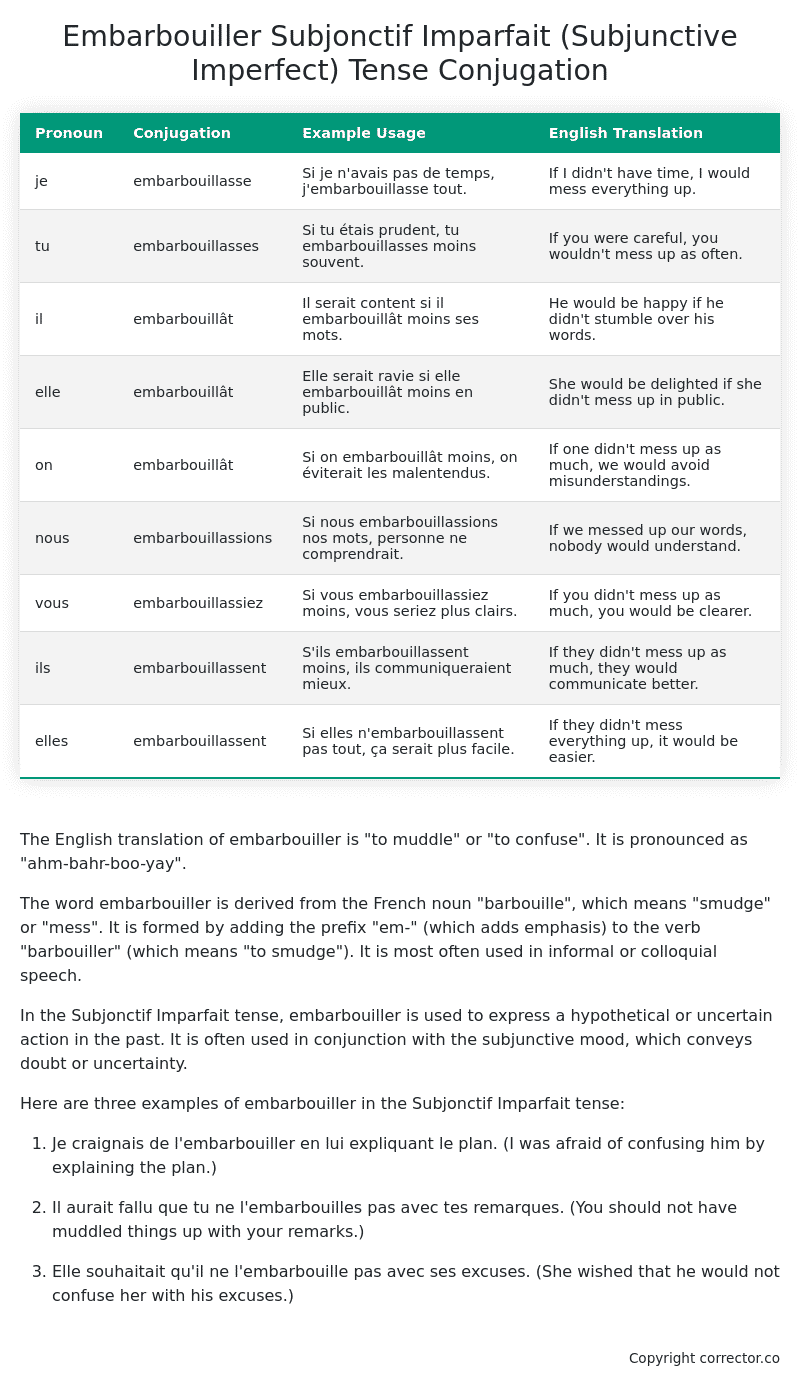Subjonctif Imparfait (Subjunctive Imperfect) Tense Conjugation of the French Verb embarbouiller
Introduction to the verb embarbouiller
The English translation of embarbouiller is “to muddle” or “to confuse”. It is pronounced as “ahm-bahr-boo-yay”.
The word embarbouiller is derived from the French noun “barbouille”, which means “smudge” or “mess”. It is formed by adding the prefix “em-” (which adds emphasis) to the verb “barbouiller” (which means “to smudge”). It is most often used in informal or colloquial speech.
In the Subjonctif Imparfait tense, embarbouiller is used to express a hypothetical or uncertain action in the past. It is often used in conjunction with the subjunctive mood, which conveys doubt or uncertainty.
Here are three examples of embarbouiller in the Subjonctif Imparfait tense:
-
Je craignais de l’embarbouiller en lui expliquant le plan. (I was afraid of confusing him by explaining the plan.)
-
Il aurait fallu que tu ne l’embarbouilles pas avec tes remarques. (You should not have muddled things up with your remarks.)
-
Elle souhaitait qu’il ne l’embarbouille pas avec ses excuses. (She wished that he would not confuse her with his excuses.)
Table of the Subjonctif Imparfait (Subjunctive Imperfect) Tense Conjugation of embarbouiller
| Pronoun | Conjugation | Example Usage | English Translation |
|---|---|---|---|
| je | embarbouillasse | Si je n’avais pas de temps, j’embarbouillasse tout. | If I didn’t have time, I would mess everything up. |
| tu | embarbouillasses | Si tu étais prudent, tu embarbouillasses moins souvent. | If you were careful, you wouldn’t mess up as often. |
| il | embarbouillât | Il serait content si il embarbouillât moins ses mots. | He would be happy if he didn’t stumble over his words. |
| elle | embarbouillât | Elle serait ravie si elle embarbouillât moins en public. | She would be delighted if she didn’t mess up in public. |
| on | embarbouillât | Si on embarbouillât moins, on éviterait les malentendus. | If one didn’t mess up as much, we would avoid misunderstandings. |
| nous | embarbouillassions | Si nous embarbouillassions nos mots, personne ne comprendrait. | If we messed up our words, nobody would understand. |
| vous | embarbouillassiez | Si vous embarbouillassiez moins, vous seriez plus clairs. | If you didn’t mess up as much, you would be clearer. |
| ils | embarbouillassent | S’ils embarbouillassent moins, ils communiqueraient mieux. | If they didn’t mess up as much, they would communicate better. |
| elles | embarbouillassent | Si elles n’embarbouillassent pas tout, ça serait plus facile. | If they didn’t mess everything up, it would be easier. |
Other Conjugations for Embarbouiller.
Le Present (Present Tense) Conjugation of the French Verb embarbouiller
Imparfait (Imperfect) Tense Conjugation of the French Verb embarbouiller
Passé Simple (Simple Past) Tense Conjugation of the French Verb embarbouiller
Passé Composé (Present Perfect) Tense Conjugation of the French Verb embarbouiller
Futur Simple (Simple Future) Tense Conjugation of the French Verb embarbouiller
Futur Proche (Near Future) Tense Conjugation of the French Verb embarbouiller
Plus-que-parfait (Pluperfect) Tense Conjugation of the French Verb embarbouiller
Passé Antérieur (Past Anterior) Tense Conjugation of the French Verb embarbouiller
Futur Antérieur (Future Anterior) Tense Conjugation of the French Verb embarbouiller
Subjonctif Présent (Subjunctive Present) Tense Conjugation of the French Verb embarbouiller
Subjonctif Passé (Subjunctive Past) Tense Conjugation of the French Verb embarbouiller
Subjonctif Imparfait (Subjunctive Imperfect) Tense Conjugation of the French Verb embarbouiller (this article)
Conditionnel Présent (Conditional Present) Tense Conjugation of the French Verb embarbouiller
Conditionnel Passé (Conditional Past) Tense Conjugation of the French Verb embarbouiller
L’impératif Présent (Imperative Present) Tense Conjugation of the French Verb embarbouiller
L’infinitif Présent (Infinitive Present) Tense Conjugation of the French Verb embarbouiller
Struggling with French verbs or the language in general? Why not use our free French Grammar Checker – no registration required!
Get a FREE Download Study Sheet of this Conjugation 🔥
Simply right click the image below, click “save image” and get your free reference for the embarbouiller Subjonctif Imparfait tense conjugation!

Embarbouiller – About the French Subjonctif Imparfait (Subjunctive Imperfect) Tense
Formation
Common Everyday Usage Patterns
Interactions with Other Tenses
Subjonctif Présent
Indicatif Passé Composé
Conditional
Conditional Perfect
Summary
I hope you enjoyed this article on the verb embarbouiller. Still in a learning mood? Check out another TOTALLY random French verb conjugation!


